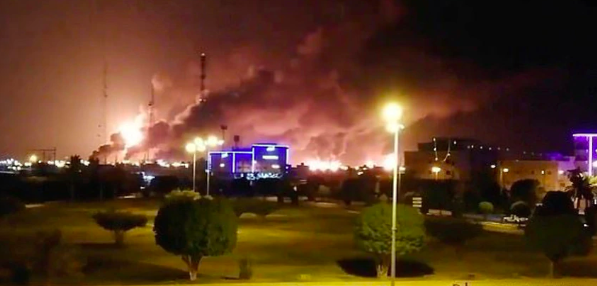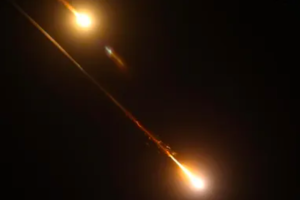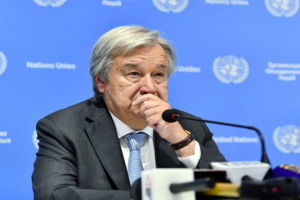Drone attacks launched by Yemeni rebels sparked fires at two Saudi Aramco oil facilities Saturday, reportedly disrupting production in a new escalation that follows a spike in regional tensions with Iran.
Huge palls of smoke rose into the sky after the pre-dawn attacks on Abqaiq and Khurais, two key Aramco facilities in eastern Saudi Arabia as the state-owned giant prepares for a much-anticipated stock listing.
It was the latest in a series of similar raids, highlighting how oil installations in the world”s crude exporter are vulnerable to Huthi rebel attacks four years after a Saudi-led coalition launched a military intervention in Yemen.
“At 4:00 am (0100 GMT) the industrial security teams of Aramco started dealing with fires at two of its facilities in Abqaiq and Khurais as a result of… drones,” the interior ministry said in a statement carried by the official Saudi Press Agency.
“The two fires have been controlled.”
The Iran-linked rebels said they launched “a large-scale operation involving 10 drones” on the plants, the group”s Al-Masirah television reported.
In a phone call with US President Donald Trump, Crown Prince Mohammed bin Salman said the kingdom was “willing and able” to respond to this “terrorist aggression”, according to Saudi state media.
Interior ministry spokesman Mansour al-Turki told AFP there were no casualties in the attacks in the kingdom”s Eastern Province.
But the full extent of the damage was not immediately clear as reporters were not allowed near the plants where Saudi authorities swiftly beefed up security.
The kingdom”s crude output was reported to be disrupted by the attacks on the Abqaiq plant — its largest oil processing facility — and nearby Khurais, which hosts a large Aramco oil field.
The Wall Street Journal reported the kingdom was shutting down half of its oil production, which amounts to a loss of about five million barrels of oil per day.
Aramco did not immediately respond to requests for comment.
“The Saudis are using language in their statements to assure customers that the fires are under control,” Samir Madani, co-founder of shipping monitoring website Tanker Trackers, told AFP.
“But there could be supply disruptions if the damage at Abqaiq is extensive.”
The UN”s Yemen envoy Martin Griffiths said he was “extremely concerned” over the latest attacks.
“The recent military escalation is extremely worrying,” he said in a statement, calling on both warring parties to exercise restraint.
The strikes also drew swift condemnation from Riyadh”s Gulf allies, the United Arab Emirates, Bahrain and Kuwait.
In recent months, the Huthi rebels have carried out a spate of cross-border missile and drone attacks targeting Saudi air bases and other facilities in what they say is retaliation for a long-running Riyadh-led bombing campaign on rebel-held areas in Yemen.
Last month, an attack claimed by Huthi rebels sparked a fire at Aramco”s Shaybah natural gas liquefaction facility — close to the Emirati border — but no casualties were reported by the company.
Rebel drones also targeted two oil pumping stations on Saudi Arabia”s key east-west pipeline in May, shutting it down for several days.
Growing rebel attacks underscore how Saudi infrastructure, including oil installations, are increasingly vulnerable to the Huthis” steadily advancing weaponry — from ballistic missiles to unmanned drones.
The Abqaiq plant, which Aramco says plays a “pivotal role” in its operations, has been targeted by militants in the past.
In an attack claimed by Al-Qaeda in February 2006, suicide bombers with explosive-laden vehicles attempted to penetrate the processing plant, killing two security guards.
The two bombers also died in the attack, which failed to breach the compound, authorities reported at the time.
Riyadh had reportedly hoped for a quick win against the Huthis, but instead waded into a quagmire that has cost it billions of dollars and tarnished its reputation, while sparking a humanitarian crisis in Yemen.
Tensions in the Gulf have further soared since May, with US President Donald Trump calling off air strikes against Iran at the last minute in June after it downed a US drone.
The United States and Saudi Arabia have also blamed Iran for multiple attacks on tankers in the Gulf.
The latest attacks come as Saudi Arabia accelerates preparations for a much-anticipated initial public offering of Aramco, the world”s most profitable company.
The mammoth IPO forms the cornerstone of a reform programme envisaged by the powerful crown prince to wean the Saudi economy off its reliance on oil.
Aramco is ready for a two-stage stock market debut including an international listing “very soon”, its CEO Amin Nasser told reporters on Tuesday.
























